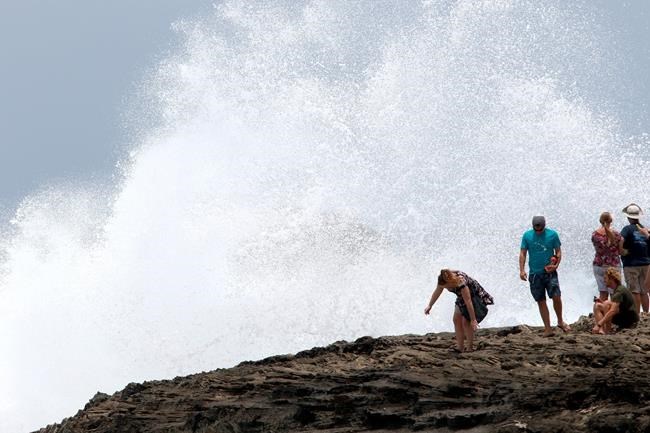
In this Sunday, July 26 2020 photo people react as a wave breaks off rocks in Laie, Hawaii. As hurricane sirens blared and government forecasters warned of an imminent hit from a "pretty nasty hurricane," some Hawaii residents skipped the shelter and went to the beach with surfboards in tow. Others climbed out onto rocks to take selfies with huge waves behind them. Hurricane Douglas eventually spun away from the islands without causing major damage, but officials worry complacency by some people could be dangerous if Hawaii gets hit by a powerful hurricane. (AP Photo/Caleb Jones)
Republished July 27, 2020 - 10:31 PM
Original Publication Date July 26, 2020 - 10:21 PM
HONOLULU - Hurricane Douglas joined a long list of hurricanes that have come near the Hawaiian Islands but didn’t cause major damage.
Kauai Mayor Derek Kawakami said such experiences unfortunately help people become complacent and think disaster will never strike them.
"What we’re really concerned about is Mother Nature — there’s no way you can control her. And the one time that she does decide to not send a message but really impact our island, it’s going to be when certain people have taken it lightly,” Kawakami said.
Douglas passed about 45 miles (72 kilometres) north of Maui and possibly even closer to Oahu as a Category 1 hurricane on Sunday.
Despite earlier warnings that Douglas could pass directly over the islands, surfers hit the waves and selfie-takers flocked to the shoreline on Oahu.
Chenay Borja went hiking with her adult son in hopes of seeing some waterfalls. She chose a ridge where there was some flat ground and where she felt she wouldn't get hurt. She also tracked the rain on radar.
She said people on Oahu stock up on food, water and supplies but also like to use the opportunity storms provide to see big surf at spots where there normally wouldn't be waves.
“One day we’re just not going to take it seriously and it’s just going to hit and we’re not going to be prepared for it," Borja said. "And yeah, we buy all the stuff, but we still go toward the storm.”
Kawakami said Kauai's history of getting hit by major hurricanes and floods have left a strong impression on the island's residents who do take weather threats seriously.
“Even people that are relatively newcomers, in a sense will hear the local knowledge, will see the people getting prepared. And they’ll just follow suit," Kawakami said.
In 1992, Hurricane Iniki damaged or destroyed 41 per cent of the island’s homes. Just two years ago, heavy rains triggered landslides that cut off entire communities on Kauai's north shore for months.
Talmadge Magno, civil defence administrator for Hawaii County, said he thinks most people heed warnings and won't test nature.
He said Hurricane Douglas offered residents a way to learn how they can do a better job getting ready for such storms.
“I think this was a good kind of test for the community as well to see where they are at in preparedness," he said.
Meteorologists said Douglas would have been a lot worse for Hawaii if it had tracked just 20 or 30 miles (32 to 48 kilometres) to the south.
“Not only did it did it not make landfall, it skirted by the islands,” National Weather Service meteorologist Chevy Chevalier said.
It's rare for hurricanes to hit the islands that are relatively small compared to the vastness of the Pacific Ocean.
“You’re not going to see them get hit that often,” Chevalier said.
Oahu did not receive much rainfall, but heavy rain and wind lashed Maui, downing a small tree on the Hana Highway.
Duke Stevens, who lives in Hana on Maui’s eastern tip, said there was no longer any wind by Sunday afternoon and the light rain that fell persistently through the night had subsided.
“I’ve seen a lot worse,” said Stevens, who has lived on Maui since 1987.
Antonia Hall, from the city of of Kihei on western Maui, said she took her porch furniture inside, bought nonperishable food and filled her bathtub for an emergency water supply, but the storm spared her area .
“Maui has skirted so many hurricanes,” she said. “This is just kind of something we go through here.”
___
Associated Press journalists Mark Thiessen in Anchorage, Alaska, Brian P.D. Hannon in Phoenix, and Julie Walker in New York contributed to this report.
__
This story corrects the spelling of Borja's first name to Chenay, not Chaney.
News from © The Associated Press, 2020